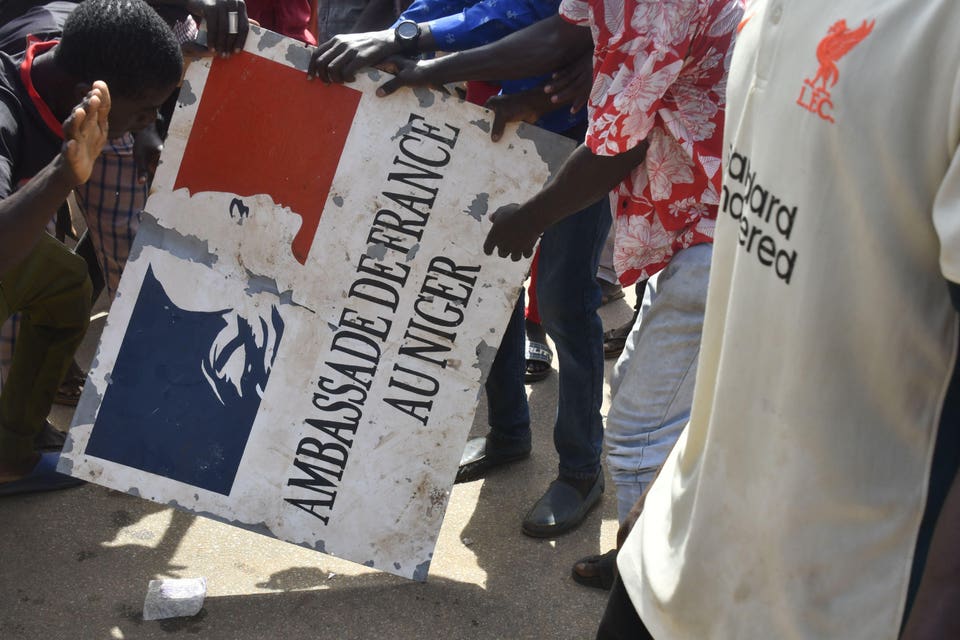TOPSHOT – Protesters hold a sign taken from the French Embassy in Niamey during a demonstration that … [+] followed a rally in support of Niger’s junta in Niamey on July 30, 2023. Thousands of people demonstrated in front of the French embassy in Niamey, before being dispersed by tear gas, during a rally in support of the military putschists who overthrew the elected president Mohamed Bazoum in Niger. Before the tear-gas canisters were fired, a few soldiers stood in front of the embassy to calm the demonstrators. (Photo by AFP) (Photo by -/AFP via Getty Images)
AFP via Getty ImagesOnce more, rumours circulate surrounding Niger and its uranium industry. First, it was falsely said that the new military regime, which took power in July, banned exports of uranium and gold, alongside Mali and Burkina Faso. Allegations also went around that France was fully dependent on Nigerien uranium, and others that it was practically irrelevant. This debate was tackled in our article.
Some accounts on social media are now circulating the claim that Niger has lifted prices from €0.80 per kilogram to €200. So far, there is no evidence for this beyond themselves quoting each other. The claim seems to trace back to a small digital outlet in Nigeria. Embarrassingly, the website has been confused as being from Niger itself.
Niger never sold €0.80 a kilogram, and there are no primary sources talking about a new price being set at €200. As in other countries, the ore was being sold near global market prices, which at the time of writing hover around $56 per pound (around €114 per kilogram). In fact, it would make little sense if the government in Niamey was able to set prices. Mining firms extract the ore, and the state holds minority stakes in projects through Sopamin (Société du Patrimoine des Mines du Niger).
Much of the political rhetoric is declaring a radical change. However, we are seeing a considerable amount of continuity. Western mining firms, notably France’s Orano, are still in the country. Some even have plans to expand. The government is yet to expel them, if it ever will. That is not to say that the political situation is not tense. The military junta has accused France of preparing for a military intervention, after President Emmanuel Macron refused to withdraw expeditionary troops already stationed in Niger.
Western mining firms staying, despite hardship Niger produced around 5% of the total global supply in 2022, being the 7th largest producer. While this can be considered a small fraction, the coup comes at a time when western countries are trying to wean themselves off Russian supply, which is the 6th largest producer. Moscow also holds significant interests in Kazakhstan, which is by far the leading source of uranium ore.
In this context, mining firms from western countries have said they intend to continue developing their operations in the Sahelian nation. This includes a statement by Orano which is committed to stay in the country. In the press release, the French firm said “the COMINAK remediation project continues in line with the Group’s commitments and the project schedule”. And “concerning the IMOURAREN project, the studies and other activities are continuing according to schedule.” In a previous article, we also mentioned Canadian Global Atomic’s intentions to continue operations.
Orano has nonetheless said that sanctions are affecting its operations. The company is halting treatment of the ore for this reason. The punitive measures are imposed by the Economic Community of West African States (ECOWAS) in an attempt to force the hand of the military junta. Regional efforts are being led by Nigeria’s President Bola Tinubu: they demand that the life of deposed, elected President Mohamed Bazoum be respected, and plans for a transition to democracy.
The French firm is also bringing forward maintenance activities, given a lack of chemical inputs. Borders with multiple of Niger’s neighbours are closed, shutting the main supply corridors via Nigeria and Benin.
The full economic and human impact of sanctions is hard to tell in its first months. However, there are already some indicators. France24 reported that the impact is also felt across Nigeria. Neighbouring Mali went through a similar process after a coup d’état in 2021. Sanctions not only affected Mali’s finances and population; they also put pressure on the region’s food prices and consequently on governments to lift them.
Follow me on Twitter or LinkedIn. Check out my website.

